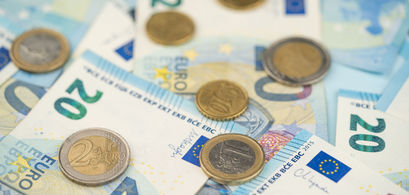Back in 1999, the European Union introduced the euro as their new currency.
It was created to promote stability and economic integration across Europe. Originally, the member countries intended to use the euro as an overarching currency for exchanges between one another.
Within three years, though, it replaced the domestic currencies of many member states. While it’s still not adopted by every member of the European Union, such as Bulgaria or the Czech Republic, many pegs their local currencies to it in some way.
One of the misconceptions is that it would be standardized against the US dollar in terms of its value. This is not true, and this is what makes investing in the euro so intriguing.
Euro vs Dollars
Since its inception, a unit of euro has fluctuated between the $0.85 and $1.58 range. The dollar was at its strongest back in 2001 and 2002, when the euro began to circulate, and its weakest following the Great Recession of 2008. In 2008, the euro to US dollar annual average exchange rate was equal to 1.47, which meant that one euro could buy $1.47.
This is one reason investors would be interested in the euro. If the relative value of the dollar rises or falls, the investor can make money from this change.
An Exchange Rate Example
If investors believe the dollar will weaken against the euro, they think the euro will be worth more in the future in terms of dollars. Over the past year, that is what happened- if an investor purchased $111 one year ago, it would have cost 100 euros. Trading 100 euros for dollars today would yield approximately $107.87. Investors would have realized a loss of approximately $3.13, which is a 2.81% loss on the $111 investment in only one year.
Why Do the Exchange Rates Change Over Time?
In a global economy, countries compete with each other for the sales of goods and services. But the problem for trade partners is figuring out the relative value of each currency. One of the major factors affecting the value of a currency is faith in a country's economy. If one country's economy is weakening relative to another, then over time, there might be a change in the exchange rate.
Why Invest in the Euro?
There are several reasons why an investor might want to invest in the euro:
Potential for gains – If the euro strengthens against the US dollar, the currency appreciation would benefit US investors that hold euros. Ultimately, this would enhance investment returns, especially if the investor can time the market and convert their euros back into dollars at a favourable exchange rate.
Investment opportunities – Investing in the euro can provide access to a wide range of investment opportunities denominated in euros, such as stocks or bonds. This allows investors to diversify their holdings, and potentially capitalize on specific sectors or assets in the eurozone.
Economic factors – Economic factors, such as interest rates, inflation, or GDP growth affect currency movements. If an investor believes that the eurozone economy will outperform the US economy, they may choose to invest in the euro in a bid to benefit from currency appreciation. Or alternatively, if interest rates are higher in the eurozone, they may earn more on their euro savings.
Risks Associated with Euro
When someone invests in a foreign currency, they are placing a bet that the euro will grow in value relative to the dollar. Before placing a bet like that, they need to understand the relationship over the past several years and try to predict what might happen in the future. In this example, the euro has weakened as compared to the dollar over the last nineteen months. The question is: Can this trend continue; will it turn around, and for how long?
To a certain degree, it's possible to compare the relative strengths of each country by examining the health of their economies. The United States has been running up some very big trade deficits, and the national debt is growing at an incredible rate.
While many Americans might believe their country will eventually repay all these loans; foreign countries are not quite as confident. When the US is seen as a relatively risky investment, then other countries will want to be compensated for the increased risk. If the world agrees, then the euro will increase in value relative to the dollar. In the same way, an economic crisis in Europe would cause the euro to fall relative to the dollar.
How Can I Invest in the Euro?
First of all, investing in foreign currencies, by means of purchasing euro with dollars in this case, is not considered a viable long-term investment. This is simply because currencies don’t usually yield returns as high as equities or bonds do – which have much greater long-term upside potential.
For those who are looking into diversifying their portfolio by investing offshore assets, foreign securities, such as stocks and bonds that are backed up by businesses and governments, make a better investment choice. Alternatively, investors can speculate on the euro’s rise or fall by trading in the currency market.
Euro ETFs
Exchange-traded funds (ETFs) are usually an easy way to gain exposure to euros without actually buying euros. These ETFs either invest in the euro directly or through euro-denominated short-term debt. As a currency ETF, a euro ETF aims to track the performance of the euro in the foreign exchange market against the US dollar or a basket of currencies.
Note: If you're interested in European equities as well as the Euro, check out our collection of the best European ETFs to buy this year.
Look out for expense ratios
An expense ratio reflects how much an ETF, or any fund for that matter, pays for portfolio management, administration, distribution, and other expenses. It’s an ongoing annual charge and tends to hover around 0.64% for currency ETFs.
European Mutual Funds or Bond Funds
A second option would be to invest indirectly in the euro again by purchasing the government bond funds or mutual funds of European countries that are euro-based. All major trading platforms will carry bond funds that fit this description.
Forex Trading
While trading in the euro isn't exactly the same concept as investing in the euro, forex is another way to take advantage of the relative movements of the currency. Trading in the forex market is viewed by many as speculation, although it can be used as a hedge too.
We have an entire article dedicated to the topic of forex currency trading, which talks about the risks and rewards associated with this exciting and controversial investment opportunity. We also list the best forex trading platforms for those who are just starting out and provide a guide to how to find the most suitable one.




